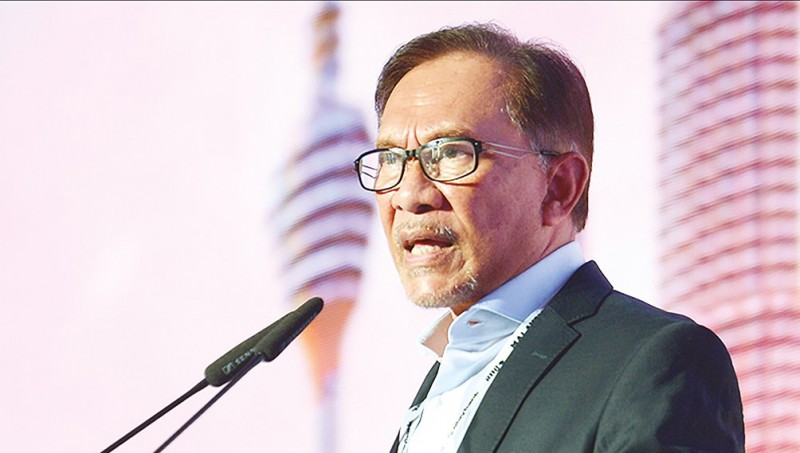
THE growth of foreign direct investments (FDIs) and investment by transnational corporations as well as multinational companies (MNCs) remain the key drivers for Malaysia’s economic growth moving forward, Opposition leader Datuk Seri Anwar Ibrahim said.
The former deputy prime minister and former finance minister emphasised that FDIs have a massive potential to support the recovery of the country by creating jobs and boosting productivity.
To realise this potential, he said it is imperative that Malaysia, as well as other Asean countries, implement the right FDI policies to enhance their competitiveness and provide foreign companies the confidence to invest.
“If you look at the figures, Malaysia’s engagement with MNCs in terms of FDI has definitely gone down a bit, similar to countries like Indonesia, Vietnam and Thailand. That’s the fact.
“Notwithstanding, there is a lot of interest coming from America, Europe and China, although there has been some delay due to the Covid-19 pandemic.
“But I think it would depend on the capacity of these countries to attract FDIs, which includes the efficiency and the speed of approvals, as well as the priorities set on what we can offer,” he said during the Bank of Singapore’s “Beyond 2022: New Horizons” virtual conference yesterday.
He also noted that the volume and opportunity for FDIs is huge from China itself and the interest from other countries is quite welcomed although it is contingent upon Malaysia’s political stability.
Commenting further, Anwar said given the present scenario, Asean would be compelled to work harder and focus more on interregional trade and investments.
He added that there is huge potential for the Asean region but some nationalistic fervour from the 80s and 90s are so strong that some countries opt to delay and limit investments.
“However, now I think that the consensus is such and given the scenario, Malaysia does need FDIs. There are no questions about it.
“We survived the 80s and the 90s because of the huge amount of FDIs and the country’s leadership at that time prioritised giving incentives to attract FDIs.
“Therefore, I strongly believe that inter-regional trade and investments remain pivotal,” he said.
Nevertheless, Anwar acknowledged that uncertainty over the course of the economic recovery remains.
He noted that with prospects of global recovery expected to be uneven, foreign MNCs are also significantly driven by shifts toward countries that offer larger markets or faster-growth opportunities.
According to the International Trade and Industry Minister Datuk Seri Mohamed Azmin Ali, FDIs into Malaysia in the first half of 2021 (1H21) soared 223.1% compared to 1H20 despite the pandemic.
The minister said this signals a rise in confidence among foreign investors in the country’s stable and conducive economic climate and business ecosystem.
He added that FDIs drove the strong and vibrant performance of the manufacturing sector during the period, registering RM58.2 billion in approved investments.
The remaining RM8.7 billion approved investments in this sector were from domestic sources.
Mohamed Azmin said in terms of total approved investments, Malaysia recorded RM107.5 billion of FDIs and domestic direct investments in the manufacturing, services and primary sectors, chalking up a massive jump of 69.8% compared to the same period last year.
Achieved amid a very challenging global economic landscape, the investments involved 2,110 projects and are expected to generate 44,994
job opportunities in the country. Moving forward, the Economic and Social Commission for Asia and the Pacific said that Asia and the Pacific economies are expected to register small, but positive, growth in FDI inflows.
However, it said in 2022, FDI is expected to remain below pre-pandemic crisis levels in the region as many economies are still struggling to contain the third and fourth waves of Covid-19, as well as speed up vaccination rollout and respond to severe socio-economic disruptions exacerbated by the pandemic.
“The coming into force of the Regional Comprehensive Economic Partnership agreement, together with the recently concluded Asean Investment Facilitation Framework, is expected to help boost more sustainable FDIs in the region, particularly value chain-linked FDIs, in the medium and long term,” it said.
The commission added that regional cooperation and political commitment to openness for investment will be critical to helping economies build back better and harness the potential of FDIs, particularly for the health sector.
It also stressed that regional and multilateral cooperation is needed in addressing transnational challenges, and make national and international investment governance more coherent and sustainable development oriented.
Source: https://themalaysianreserve.com/2022/01/12/anwar-fdis-remain-pivotal-for-malaysias-economic-growth/

